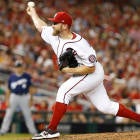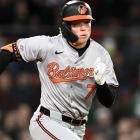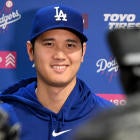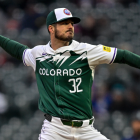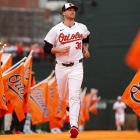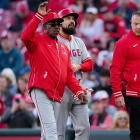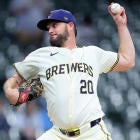WASHINGTON -- Entering Tuesday night's National League Wild Card Game between the Milwaukee Brewers and Washington Nationals, the focus was on how manager Davey Martinez would use his pitching staff -- and whether he would deploy Stephen Strasburg and/or Patrick Corbin in relief of scheduled starter Max Scherzer.
By the end of the game, the Nationals' eighth-inning rally against Milwaukee closer Josh Hader -- which culminated with right fielder Trent Grisham making an error on a Juan Soto single, swinging the game from a 3-1 Brewers lead to a 4-3 Nationals lead -- had overshadowed that Martinez did indeed use Strasburg in relief of Scherzer, and thus set up his club for a trip to the NL Divisional Series, where they'll face the seemingly unbeatable Los Angeles Dodgers.
To some extent, if any NL club is up for the challenge -- and let's be clear, the Dodgers winning the pennant has been treated as a near-fait accompli -- then it might be the Nationals. Yes, the team who needed an act of providence to advance to the matchup in the first place.
Remember, though, that while the Dodgers had the best run differential in the NL (274), the Nationals had the second-best, at 149. That's still a ridiculous gap -- larger than the Nos. 1 and 2 distinction indicates. But there are other factors at play suggesting the Nationals have a shot.
The Nationals, foremost, have the ability to match the Dodgers' fearsome rotation -- yes, even after using two of their three aces on Tuesday. That's because the Nationals can start Patrick Corbin in Game 1 on Thursday before potentially running out Strasburg in Friday's Game 2 on short rest if they so desired -- Strasburg threw 34 pitches on Tuesday. Scherzer would then be able to take the ball in Game 3, with Anibal Sanchez slotting in as the Game 4 starter -- unless the need arises to recall Corbin in an elimination-game scenario.
Of course it's possible the Nationals opt against using Strasburg in such an aggressive manner and just turn to Sanchez in Game 2. That's to be seen, and certainly no one could fault them for prioritizing Strasburg's long-term well being -- and no, the potential that he opts-out at season's end shouldn't give the Nationals a license to abuse his arm this postseason.
Regardless of how the rotation works out, the Nationals do appear to have a lineup that can hang with the Dodgers -- they rank first and third in the NL in adjusted weighted runs created, a FanGraphs-calculated figure that contextualizes numbers based on ballpark.
In the end, the bullpens could serve as the X-factors. It's worth noting that Washington turned to right-hander Daniel Hudson for the ninth rather than their standard closer Sean Doolittle. Perhaps Martinez was committed to getting Hudson into the game after warming him up so many times, but Doolittle had an uncharacteristically shaky season. (Being fair, Doolittle did pitch better after returning from the injured list in September, and was warming in the ninth.)
Obviously there's more to a bullpen than the ninth, and that's where things will get tricky for the Nationals. Mike Rizzo overhauled his bullpen last winter and again this summer, but the club could be dependent on the likes of Fernando Rodney, Wander Suero and Tanner Rainey -- who walked seven batters per nine -- in high-leverage spots versus the best team in the league.
The Nationals, then, will need their aces to pitch as they have all season -- well and deep into games -- and will need their lineup to find ways to score against the Dodgers' excellent trio of Hyun-jin Ryu, Walker Buehler and Clayton Kershaw. That sounds so easy on paper; it won't be in practice. But that looks like what it'll take for the Nationals to knock off the Dodgers and earn the first postseason series victory in franchise history.













